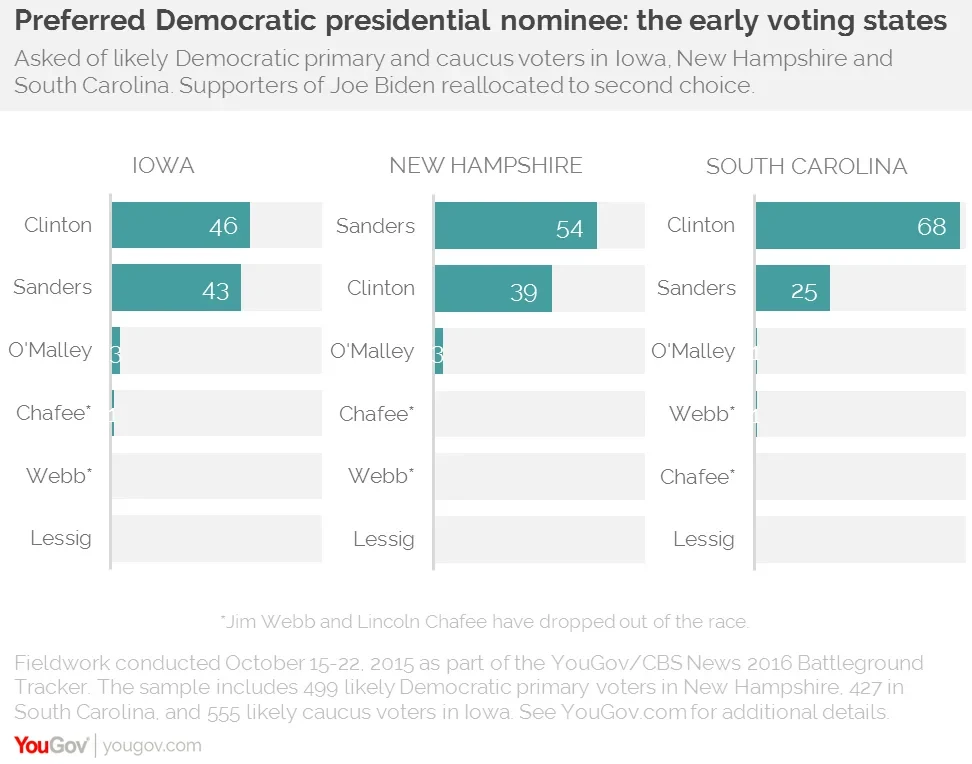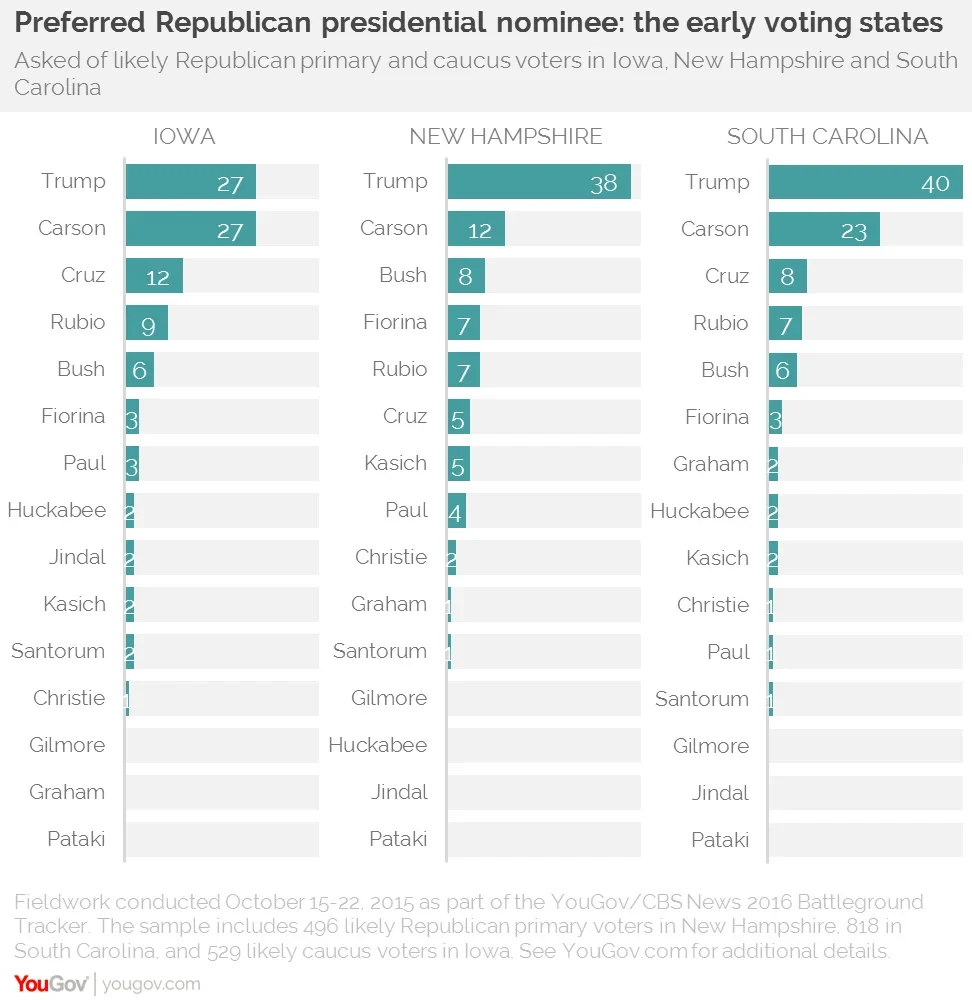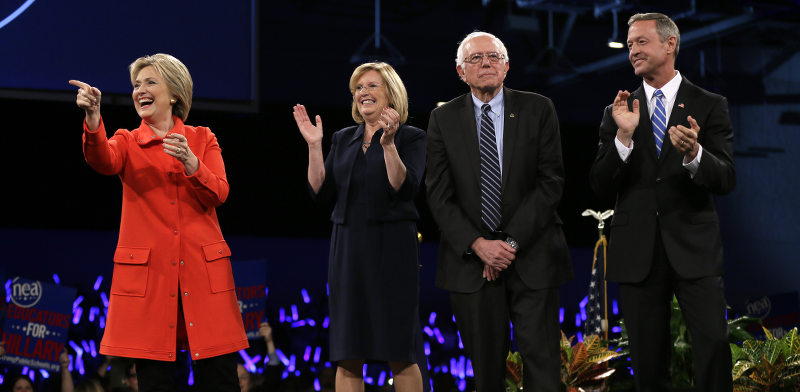The second wave of the YouGov/CBS News Battleground Tracker polled primary and caucus voters from both parties in Iowa, New Hampshire and South Carolina
Hillary Clinton has climbed to a narrow lead over Sen. Bernie Sanders among Democrats in Iowa while narrowing the gap in New Hampshire, according to the second wave of the YouGov/CBS News Battleground Tracker. In the Republican race, retired neurosurgeon Ben Carson has caught up with Donald Trump in Iowa – but continues to lag far behind him in New Hampshire and South Carolina.
The Democrats
Hillary Clinton now has the support of 46% of Democratic and Democratic-leaning independents in the Hawkeye State, barely ahead of Bernie Sanders with 43% support.
Clinton’s narrow lead in Iowa, while it is within the margin of error, is nevertheless a significant turnaround for Clinton, who trailed Sanders by 10 points in the September YouGov/CBS News poll of Iowa Democrats. Few other polls showed Clinton trailing at the time, but the movement in Clinton’s favor is consistent with recent national and state polls.
Joe Biden announced he would not run for president on Thursday, while the fieldwork for the poll was underway. The figures cited for Clinton and Sanders include voters who initially picked Biden but chose Clinton or Sanders as a second choice in a follow-up question. Biden supporters mostly go to Clinton, though Sanders and Clinton benefit equally in New Hampshire. However, Clinton has increased her support in each state by between five to nine points even when Biden is included. Lincoln Chafee and Jim Webb also dropped out of the race last week, but neither had significant support.
The former Secretary of State remains behind in another first-in-the-nation primary state, New Hampshire, where Sanders holds a commanding 15-point lead. However, the Vermont senator led by 22 points in September, and with Biden out of the picture Clinton’s support is up 9 points. Other polls have shown a close race in New Hampshire since the Democratic debate on October 13th, with several putting Clinton ahead.

Clinton retains an overwhelming advantage among African American voters in South Carolina, helping her achieve to a massive 43-point lead overall. Sanders actually leads Clinton among white Democrats in South Carolina, 51% to 44%. But Clinton leads Sanders among black Democrats by 79 points. Here she also particularly benefits from Biden's exit: 92% of would-be Biden supporters in South Carolina name Clinton as a second choice.
Clinton supporters and Sanders supporters are distinctive groups in a few other ways. About a third of Sanders’s backers are under 30, compared to only 7% of Clinton’s. Democrats in the Sanders camp are evenly divided between men and women, whereas two thirds of Clinton backers are women. Sanders supporters are also much more likely to identify as liberal in their political views.
The YouGov/CBS News 2016 Battleground Tracker is based on surveys of registered voters who had previously voted in primaries in Iowa, New Hampshire and South Carolina. The poll was conducted online but included registered voters who were contacted by phone. The sample includes 548 likely Democratic primary voters in New Hampshire, 528 in South Carolina, and 646 likely caucus voters in Iowa. The majority of respondents are recontacts, meaning most also participated in the September wave of the poll. See a more detailed description of the methodology used here.
The Republicans
The Republican primary race has seen less movement since September, though Donald Trump’s dominance is no longer absolute.
Ben Carson and Trump are now tied at 27% support among Republican and Republican-leaning likely caucus-goers in Iowa, where Trump had lead by four points previously.
As in September, Carson and Trump take the first or second spot in all three states, and Trump’s support has grown by four points in South Carolina but fallen by two in New Hampshire.

Carson tends to do better, and Trump worse, with women than men. He is also especially popular with evangelicals. There are some indicators the race could swing further Carson’s way. Those who don’t already support Carson are far more likely to say they would be “satisfied” if he became the eventual nominee than for other candidates.
The only Republican who has unambiguously improved his standing since September is Marco Rubio, though he remains outside the top three. The Florida senator’s support has grown by five points in New Hampshire, four in South Carolina and three in Iowa. Another candidate to watch is Texas Sen. Ted Cruz, who takes the third-place spot in Iowa and South Carolina for the second month running. Cruz polls especially well with Tea Party supporters, “very conservative” Republicans, and, to a lesser degree, evangelicals.
The poll also contains evidence of a populist streak in the Republican primary electorate. As in September, candidates who have never held elected office (Trump, Carson and Fiorina) take over 50% of all support. Majorities of likely Republican primary and caucus voters in Iowa, New Hampshire and South Carolina say the party is not paying enough attention to the needs of the “middle class” – and significant numbers say the party pays too much attention to the needs of “the wealthy” and “large campaign donors”.
The Republican portion of the sample includes 496 likely Republican primary voters in New Hampshire, 818 in South Carolina, and 529 likely caucus voters in Iowa.
PA image
Full results and margins of error:
Iowa
New Hampshire
South Carolina














